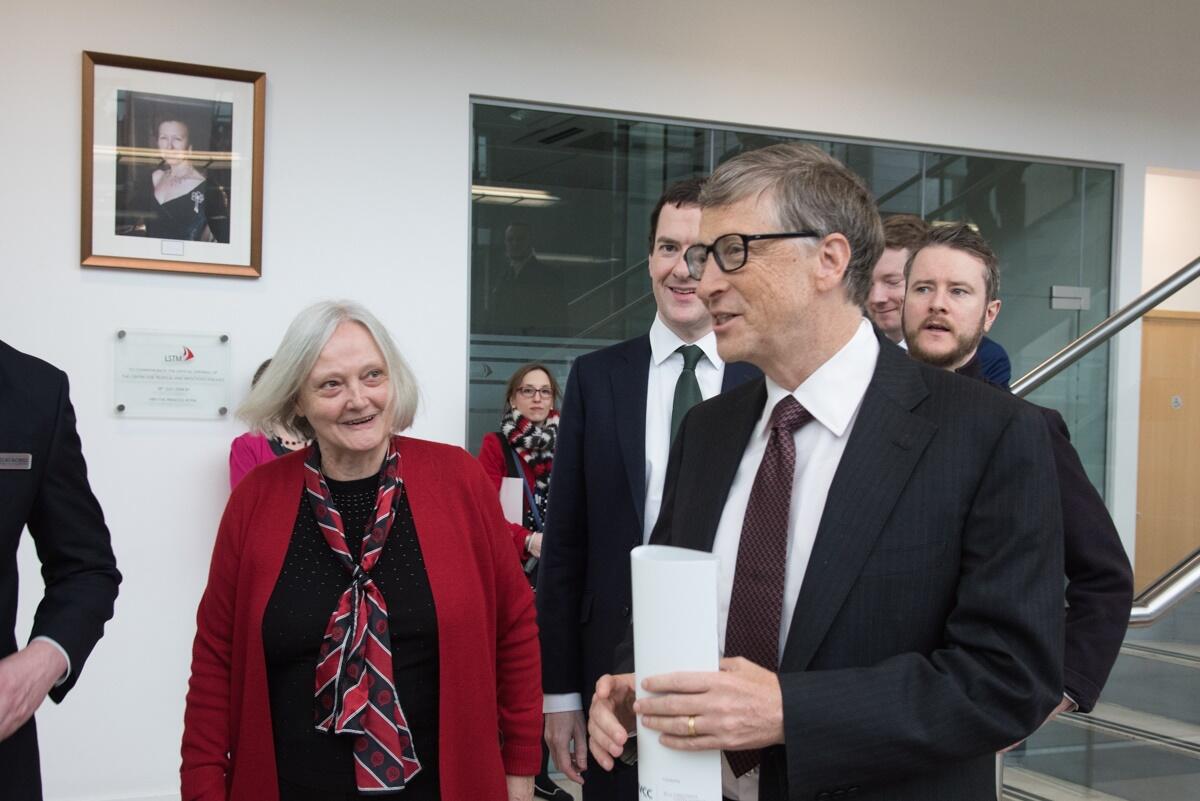
Chancellor George Osborne and Bill Gates dedicate £3 billion to the fight against malaria and infectious diseases
LSTM played host to The Chancellor of the Exchequer, The Rt Hon George Osborne MP, and the American philanthropist Bill Gates earlier today. Both guests addressed an audience of invited guests and media to talk in detail about the recently announced Ross Fund.
The £3 billion initiative includes the Ross Fund, which is named after the UK’s first Nobel Laureate and LSTM’s first lecturer, Sir Ronald Ross, and will be used to support the global fight against malaria and other infectious diseases. The Fund will be supported by the Bill and Melinda Gates Foundation (BMGF) of which LSTM is a major recipient. LSTM Director, Professor Janet Hemingway CBE, welcomed all guests to LSTM, making reference to LSTM’s past and its current standing at the forefront in the fight against malaria and other tropical diseases.
Professor Janet Hemingway said that ‘LSTM is proud to be chosen as the venue for the more detailed announcement on the Ross Fund, given LSTM’s association with Ronald Ross. It is a unique opportunity that this money is being made available to further the ongoing excellence in research, particularly in the field of resistance to infectious diseases. A huge amount of progress has been made over the past decades but we are increasingly facing new challenges especially in trying to stem the rising tide in insecticide resistance, a rapidly growing problem in vector control.’
Along with the support for malaria and other infectious diseases, the Ross Fund will also allocate £200 million to the so-called Neglected Tropical Diseases (NTDs) and over £300 million fighting AMR.
LSTM has played a key role in bringing these diseases to the attention of policy makers, most notably during last year’s G7 summit in Germany, by LSTM Emeritus Professor David Molyneux. In a response he said ‘NTDs are increasingly seen as true markers of poverty and LSTM utilises its breadth of scientific research, from the lab to actual implementation, for the benefit of the more than billion people who are somehow affected by these debilitating diseases.’
LSTM hosts a number of research consortia that focus on NTDs, such as the BMGF funded A∙WOL consortium, which aims to develop new drugs against river blindness and elephantiasis; COUNTDOWN, funded by the Department for International Development (DFID) which aims to control and eliminate the seven most common NTDs by 2020; and the Filarial Programmes Support Unit (FPSU) which aims to eliminate lymphatic filariasis in up to 12 countries.
Sir Ronald Ross became LSTM’s first lecturer in 1899, a year after LSTM was founded. He received the Nobel Prize for Medicine in 1902 for demonstrating the transmission of malaria to humans via mosquitoes. Today LSTM hosts the largest number of medical entomologists in the UK and LSTM’s translational activities cover the whole so-called research trajectory: from laboratory based research through to clinical trials; implementation research and the development of tools for the monitoring and evaluation of disease transmission and resistance.